Sean McBride's Blog
November 23, 2023
Thankful for Fantasy

“Fantasy is a necessary ingredient in living, it’s a way of looking at life through the wrong end of a telescope, and that enables you to laugh at life’s realities.” – Dr. Seuss.
“Fantasy, abandoned by reason, produces impossible monsters, united with it, she is the mother of the arts and the origin of marvels.” Francisco Goya.
“Fantasy is hardly an escape from reality. It’s a way of understanding it.” Lloyd Alexander
I’ve spent the more significant part of the last seven years writing a weekly blog that covers famous fantasy authors, and believe it or not, I’ve only gotten through two different authors. H.P. Lovecraft and, currently, J.R.R. Tolkien.
Meanwhile, during that time, media like Critical Role and Stranger Things have increased the popularity and accessibility of Dungeons and Dragons (and general role-playing games).
“Fantasy is a necessary ingredient in living, it’s a way of looking at life through the wrong end of a telescope, and that enables you to laugh at life’s realities.” – Dr. Seuss.
“Fantasy, abandoned by reason, produces impossible monsters, united with it, she is the mother of the arts and the origin of marvels.” Francisco Goya.
“Fantasy is hardly an escape from reality. It’s a way of understanding it.” Lloyd Alexander
I’ve spent the more significant part of the last seven years writing a weekly blog that covers famous fantasy authors, and believe it or not, I’ve only gotten through two different authors. H.P. Lovecraft and, currently, J.R.R. Tolkien.
Meanwhile, during that time, media like Critical Role and Stranger Things have increased the popularity and accessibility of Dungeons and Dragons (and general role-playing games).

I’m happy about this resurgence. I’ve played role-playing games and read fantasy books my entire life, but it’s hard to explain what it does to someone who doesn’t appreciate it.
I will tie Horror with Fantasy here (just like Lovecraft was also part of my blog) because they are the same.
Horror, just like anything else, has levels. There is Horror that is just there for the scared or the gross-out, but excellent Horror is there to explore grief, courage, and the human condition. The use of subtext is paramount because the antagonists in good Horror are almost always the characters themselves. It is something internal they must work through, some wound that they never dealt with that manifests into some epic evil.
Likewise, in Fantasy, you might have a simple story of a group on some adventure, but excellent Fantasy incorporates themes of PTSD, hope, and friendship. In good Fantasy, characters go through outrageous ordeals and must live with their decisions. In most Fantasy, the odds are overwhelming, and the protagonists must gather their courage and face stronger foes that outnumber them.
So what does that do for the person consuming that media? Why is Fantasy an essential part of our collective consciousness, even when describing things that don’t occur in this world?
It’s because of what Fantasy does; it deals with deeper issues and it’s escapism. When you are dealing with something as serious as PTSD, facing that condition straight on with a realistic dramatic story that shows a character going through what you had gone through actually might not help that much. Sure, you can have the experience of seeing someone go through whatever you went through. Still, a dramatic, visceral take might trigger you more (I hate to use the word trigger because it’s overused in our modern parlance and diminishes people who genuinely have to deal with such things, but it’s the most appropriate word in this instance).
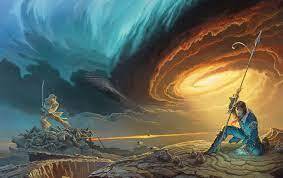 Art from The Stormlight Archive by Michael Whelan
Art from The Stormlight Archive by Michael WhelanTake a book like “The Stormlight Archive” by Brandon Sanderson. It’s a High Fantasy series where each character has to deal with something horrendous. Whether it’s war, abuse, or death and grief, each character must navigate and work through these problems subtly while at the same time dealing with the fantasy world they live in.
The fantasy aspect takes away some of the real-world stings of events and enables us as readers to process some of the trauma realistically, much more than being faced with Horror and made to deal with it head-on.
This idea is precisely the point of the Lloyd Alexander (novelist, most well known for his fantasy books for young readers) quote above. Fantasy allows you to have an extremely complex reality and break it down in a way conducive to healing, enabling understanding.
 The Black Cauldron
The Black CauldronLikewise, Dr. Seuss’s quote might seem a little out of place, but what he’s saying is that Fantasy allows us to take something from our lives and then take it to its extreme, which turns something potentially harmful into something absurd. It will enable you to release some of the gravity of reality because you can suddenly see that those things weighing on you may not be as bad as they seem if you have to sit in their emotion.
Nostalgia and levity, perspective, and release are what these two quotes are all about. We read these types of Fantasy when we see something like Tolkien. Lloyd Alexander (If you have not read or seen the Disney version of The Black Cauldron, stop what you’re doing and do so). But there is another type of Fantasy. A much darker aspect, and that is what Goya speaks of in his above quote.
Goya is talking about Exorsizing our Demons, and it’s why people love the darker turn of Fantasy and all of Horror. Everyone has fears and demons that they harbor inside, and everyone has to deal with them to a certain degree.
One of the steps of recovery from trauma (and of psychological trials like anxiety) is verbalizing or visualizing the actual trauma. It becomes much easier to deal with if you can manifest your fear and see it for what it is. A famous psychological test is the “Then what” test. You state your fear (I’m going to fail a test); once externalized, you ask, “Then what?” (My grade will go down). “Then what?” (I’ll have to study harder. My parents will be mad at me.) “Then what?”
Eventually, you get to a point where there is nothing in the well to worry about, and looking back, the fear is diminished because the result is very rarely the worst-case scenario in the first place.
Goya is manifesting the worst-case scenario and bringing it to the forefront, except what happens in Fantasy? Very rarely, the worst-case scenario. The giant monster emerges (the worst fear), and the protagonist prevails (even if they don’t eliminate the big bad).
 Francisco Goya “Saturn Eating His Son”
Francisco Goya “Saturn Eating His Son”Fantasy is a way to face your fears and prevail over them. Fantasy is a way to show that it’s possible.
So, on this Thanksgiving Day, I’m thankful for Fantasy. I am no longer hiding the fact that I love the genre and that it can be less than Literature because what good Fantasy does is heal our souls, and everyone needs a little healing sometimes.
November 16, 2023
A Thursday Treat

Happy Thursday! So, I have fallen behind a bit in my Tolkien reading, and with Thanksgiving right around the corner, I’m going to take this week and next week off of the Blind Read blog. I can’t leave well enough alone however, so I’m going to give you all a little treat this week with a sneak preview of my New Novel “The Monster in the Woods.” It’s a fantasy/heist story with a mystery at it’s core, that follows a group of teens trying to figure out if the Monster threatening the town they live in is real or not. Told in a revolving POV, it’s a death defying adventure in the classic vein of The Goonies. Hope you enjoy and let me know what you think!
Chapter 1
Lishtest
There was a soft click and suddenly haunting beautiful music echoed across the camp, lending a surreal tint to the night. Fog had rolled through, which led to a particularly claustrophobic aura over the two guards. Jack sat cross legged with his back to the town wall, facing the fire and beyond into the woods. Taun sat to Jack’s left but parallel to the wall still facing the fire. Lishtest sat opposite Taun, studying the fog, polishing her pauldrons. Lish was their Captain and always believed in a clean, well oiled uniform. Tidiness meant order and order meant discipline, and Discipline meant she could keep people alive.
“Turn that thing off, man,” Taun complained. “It’s creepy enough out here without you giving it a soundtrack.”
“Come on! My son gave this to me,” Jack whined. “Behbet said my youngest walked into a store and listened to it for a minute. She said his eyes got this glazed over look to them, and then she said he turned to her and looked her in the eye and with a super serious expression said to her, ‘Dad should have this.’ It just hit me when she told me that. He’s my son, you know? But when she told me that, it was like, he thinks of me like I think of him. And I’m out here and he’s in there. I want to hear it to remind me of him, but I want him to know I have it, because it was so important to him. Even though it’s creepy as hell.”
“Damn man, I didn’t know,” Taun said. Lish looked up at Taun and she was surprised to see that he actually looked like he could be experiencing some kind of emotion.
“Naw, I gotta stop it,” Taun said and swiped the box from him. Lish smiled. Now he was acting like the Taun she expected.
It was their Tenth day and Eleventh night out beyond the walls of the town. They got very little sleep out here, despite the fact that the Ferrians probably would not be attacking any time soon. Their army was too green, too weak to take on Teriistown. It’s walls were too high and reinforced, their army was too powerful. They raised warriors afterall, drafted as children and taught to be soldiers all their lives. No matter how angry the Ferrians were at Duke Siiran for the new policy he had instilled on them she didn’t think they would come and revolt.
It was getting monotonous. Everyday, she would send out some mix of the three of them out to range and survey the forest, while the third stayed back at camp for hours on end with nothing to do but collect firewood and boil rations. They had just begun their fourth rotation, and discipline in camp was already deteriorating to the point where Taun felt he could take Jack’s music box, no matter how annoying the thing was. She was going to have to put her foot down.
“Give me the box,” Lish said, almost under her breath.
“Awe, Cap, we were just messing around,” Taun began, but she wouldn’t let him finish.
“Captain,” she said it a bit too harshly and internally winced, but there was no going back now.
“Sorry. Captain,” Taun said and handed the music box to her. “Just having a bit of fun.”
Lish took the music box, nodded slightly to Taun and took it to her tent. She opened her chest and buried it underneath her clothes, before coming back out and sitting by the fire. Good. Taun took it seriously. He still had respect for the uniform. As a captain, out here, beyond the wall, there was nothing more important that your soldier’s respect.
“Wait sir, so I cant have it back?” Jack said. “I didn’t do anything wrong!”
Damn, Lish thought. She leaned forward and looked directly into Jack’s eyes. The fire reflected in his eyes the anger back at her.
“Lieutenant. There are three of us out here. Are we friendly, yes. Is there a chain of command, yes. You both need to know that if one of you gets in trouble, you both get in trouble. Has it been that long since Basic Training?”
“My son gave me that music box.”
“And you can have it back in the morning,” Lish said, then leaned back on the stump.
“I’m not a child, and that box is important to me.”
“You are not a child, lieutenant. But Ferrians aren’t all that we are out here to watch out for, and there’s no reason to call more attention to ourselves than is particularly necessary. Playing it during the day when we can see into the woods is one thing, but playing it at dusk, while we have a fire to make the darkness darker, and there is a fog giving more cover, you’re really going to play music to mask the sound of something approaching?”
“Something approaching. Ferrian’s aren’t all? You really believe there’s some kind of monster in these woods?”
“I mean, did you see the Carpenter? Dude was shredded. I’m not even sure if they know if it’s really the Carpenter, he’s so messed up.” Taun responded.
Lish gave Taun a look. “No, I do not believe there is a monster in these woods, lieutenant. I do think there are some large animals, and maybe one that has grown a little too big and someone thought it was a monster. It doesn’t change the fact that something can still sneak up on us in this kind of environment, natural or not, if we’re making a whole bunch of noise. This conversation is not helping. Do I make myself clear?”
Before Jack could respond, Taun interrupted. “Did you hear that?”
“Oh shove it Taun,” Jack said.
“I’m being serious! That way,” Taun pointed off slightly north-east.
“Grab your weapons,” Lish said as she stood and glared out into the fog filled woods. She was looking for movement, but the firelight danced through the fog and her mind made her see figures dancing in the darkness.
She noted the action on Jack and Taun’s rifles and knew they were following her lead. Nothing like a threat to snap someone to attention. She worked with them enough to know that Taun was flanking out to the right, and Jack was moving the other direction. Lish would take the middle as the ranking officer.
She began to move toward the forest slowly. Her rifle held up, she strafed the forest edge. She took a moment to steady her breathing and felt adrenaline give her senses a lift. The forest was dark and thick with brambles, but came into focus as she moved away from the fire. She saw it. It was big, bigger than a bear. It’s hide was glinting from the fire which meant it had some kind of Chitin or armor, but she wasn’t sure if it had thick long hair, or tentacles. It’s eyes glowed green as it locked with hers.
She took another steadying breath while she raised her hand and pointed at it. “There,” She said in an octave lower than her normal voice.
The thing seemed to snuffle in anger, like her dog did as a kid if it didn’t get what it wanted. It seemed to blink in and out of existence for a moment. She couldn’t be certain how it moved, but all the sudden it was five foot to the left of where it was. Everything in her wanted to pull the trigger, but she didn’t know anything about it and she needed Taun and Jack to give her the signal that they were in place before she acted.
It blinked again and it was closer. It’s eyes never left hers, but there was something in them, something unnatural. Just two glowing orbs, no iris, no cornea. It really was a monster.
“Hup,” Jack called out. He was in place.
She rested her finger on the trigger and gently began to squeeze.
It looked at her again and somehow those orbs conveyed curiosity.
“Hup,” Taun called out.
Her finger squeezed and a moment later she heard the discharge of both their rifles.
The creature blinked again, and it was on Taun. He screamed. It was a sound Lish never thought a human could create. She slid another bullet into the chamber and slid the bolt handle shut in one fluid motion and fired again. Taun was using his rifle as a baton swinging it against the thing, as he tried to maneuver away, but it stayed on him.
She fired again and again and she heard the report of Jack firing as well, but the thing didn’t seem to even feel it. She couldn’t see it attacking Taun either, but his skin kept rending in places, spilling bright red against the foggy gray night.
Taun continued to battle and dance away from the creature, but she could see his movements were slowing.
“Jack, Fire!” She ordered. She grabbed a log she could swing and stuck it in the camp fire. The log took forever to light and Jack appeared next to her continually firing and reloading his rifle. Taun screamed one more gargling scream and then abruptly stopped.
Once the log was lit, she ran at the creature and it blinked again. It was suddenly right in front of her and that Green Orb was the size of her head. She shoved the log into the eye, fire first. The creature squealed and a moment later she felt herself flying through the air back towards the campfire.
She heard Jack’s battle cry, but it turned to a drowning gargle before she blacked out.
November 9, 2023
Blind Read Through: J.R.R. Tolkien; The Book of Lost Tales, Part 2, Túrin Turambar Final Thoughts
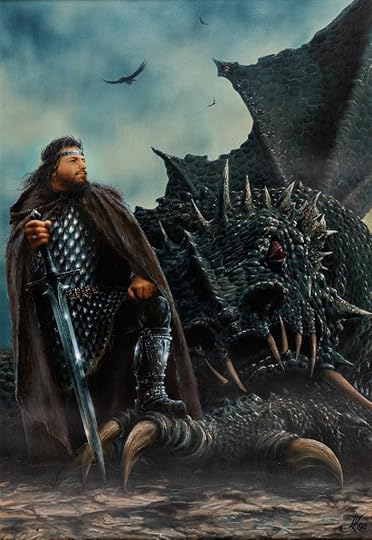
“Turambar indeed had followed Nienóri along the black pathways to the doors of Fui, but Fui would not open to them, neither would Vefántur. Yet now the prayers of Úrin and Mavwin came even to Manwë, and the Gods had mercy on their unhappy fate, so that those twain Túrin and Nienóri entered into Fôs’Almir, the bath of flame, even as Urwendi and her maidens had done in ages past before the first rising of the Sun, and so were all their sorrows and stains washed away, and they dwelt as shining Valar among the blessed ones, and now the love of that brother and sister is very fair; but Turambar indeed shall stand beside Fionwë in the Great Wrack, and Melko and his drakes shall curse the sword of Mormakil (pgs 115-116).”
Welcome back to another Blind Read! This week, we’ll give some final thoughts on Turambar and the Foalókë, including some semantics and religion, to better understand what Tolkien was trying to do in this history of Middle-earth.
I chose the opening quote of this essay because I think that religion is at the cornerstone of everything that Tolkien was doing at this point in his career.
This story iteration was a mixture of the third and fourth drafts Tolkien’s son, Christopher, edited together. That quote that starts this essay has so much to unpack, and it’s all about meaning, life, and the afterlife.
A few sentences above that quote, we find that Úrin and Mavwin go to Mandos after dying, heaven in this world. Úrin spent his life struggling against Melko as a thrall and a man who tried to better those around him. Mavwin tried to do her best for all of her children and for the town she lived in. So, it makes sense that these two would be gifted an afterlife.
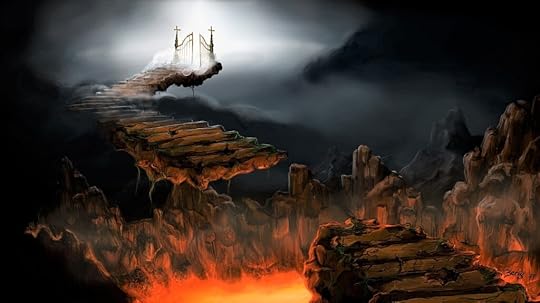
Túrin and Nienóri were denied entrance to Mandos, so they went to Fui and Ve, which are Purgatory and Hell, respectively. Strangely enough, they are also denied entrance to these places of the afterlife. So what does that leave them?
This might be the first time in the history of Middle-earth that the possibility of a spirit (or spirits) wandering the lands comes into play. The Valar looks at these two humans and decides they are not worthy of any afterlife because of their actions. Túrin with the deaths he caused, and Nienóri because she had a child with her brother and killed herself.
Judgement rains down on the two despoiled people from every direction. They hold themselves accountable and let depression and hatred of their actions lead them to suicide. At the same time, they feel the disgust of those around them, and even the Gods (in the form of Valar) tell them that they are not worthy of the afterlife because of their actions.
You must remember that Humans at this time were the only conscious beings living on Middle-earth who actively died (Elves could die from martial means, but otherwise, they are immortal, and the Valar are eternal gods), so damning a human to eternal torment of staying in the place of their transgressions and forever having those reminders was a cruel punishment.
This brings me to my next point: Tolkien wrote this as a tragedy of the tallest order, much more so than the story of Beren and Lúthien. To illustrate this, here is the literary definition of tragedy from Encyclopedia Britannica (forgive the pedantry).
“Although the word tragedy is often used loosely to describe any sort of disaster or misfortune, it more precisely refers to a work of art that probes with high seriousness questions concerning man’s role in the universe.”
Tolkien saw some horrible things during his lifetime. He spent years of his youth in the trenches of World War I and saw what bullets, mortars, and Mustard Gas did to people—this time had an indelible mark on his life and his writing. Many people think that his battle scenes are where his time at the Front comes into play, but to be quite honest, that could be imagination (I have written battle scenes, as have many authors who have never seen war).
I contend that what Tolkien took from World War I was instead a deeper perspective on humanity and tragedy.
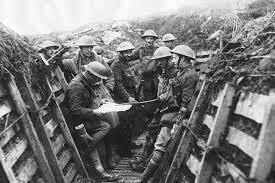
The humans in Middle-earth had to come to grips with a shorter life span and thus had to work through their emotions of the knowledge of death faster than the Elves or the Valar.
That understanding echoes the real-life experiences in war and better explains the impetuousness of Túrin.
The Elves and Valar had the time to contemplate their actions and trajectories, but humans were born knowing they would die. That knowledge, living with beings that knew they couldn’t die, affected humans strangely. They strove to make a name for themselves; they aimed for meaning and legacy. Once someone gets a taste of notoriety, pride enters, and there is no more tremendous anger than damaged pride.
This is the start of Túrin’s fall and the beginning of his tragedy. He murders Orgof for being bullied, and though he is forgiven for this transgression, he is never able to forgive himself. His actions had to be more severe as he aged because a more significant action was the only way to make up for his earlier actions.
That is the true tragedy. Túrin, as all the people around him would probably attest, only ever wanted to help his fellow man and make the world better, but because of his past and his drive, it leads to wrong decision after bad decision, which creates murder and destruction in its wake.
Bringing this back to the definition of tragedy, this tale is only “high seriousness” and shows how mortality can change how people see the trajectory of their lives. Man’s mortality becomes the defining characteristic of their early existence on Middle-earth, and it takes them generations to come to grips with that mortality (which they never indeed do).
Then we layer on that Tolkien meant for these tales to be a mythology for England, kind of a pre-history of our current lives, and it shows how our ancestors dealt with fame, love, and mortality, which informs us as a culture and species moving forward.
November 2, 2023
Blind Read Through: J.R.R. Tolkien; The Book of Lost Tales, part 2; Túrin’s last tragedy
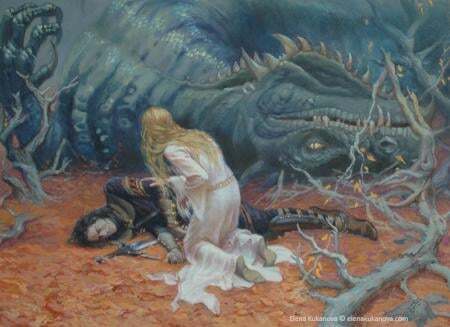
“There did she stay her feet and standing spake as to herself: ‘O waters of the forest whither do ye go? Wilt thou take Nienóri, Nienóri daughter of Úrin, child of woe? O ye white foams, would that ye might lave me clean – but deep, deep must be the waters that would wash my memory of this nameless curse. O bear me hence, far far away, where are the waters of the unremembering sea. O waters of the forest wither do ye go?’ Then ceasing suddenly she cast herself over the fall’s brink, and perished where it foams about the rocks below; but at that moment the sun arose above the trees and light fell upon the waters, and the waters roared unheeding above the death of Nienóri (pg 109-110).”
Welcome back to another Blind Read! This week, we conclude the tale of Turambar and the Foalókë and experience the last tragedies of Turambar’s life.
We left off last week with Turambar and Níniel deciding to ride out against the Foalókë, Glorund, to kill the drake. They gathered with them a group of men desperate to rid their land of the terrible beast, but on the way to the drake, they slowly abandoned the mission, leaving only a handful of mercenaries left, and “Of these several were overcome by the noxious breath of the beast and after were slain (pg 104).”
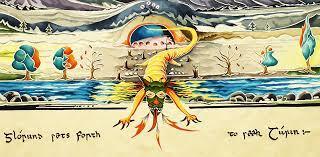
Eventually, only Turambar and Níniel were left to face the beast. “Then in his wrath Turambar would have turned his sword against them, but they fled, and so was it that alone he scaled the wall until he came close beneath the dragon’s body, and he reeled by reason of the heat and of the stench and clung to a stout bush.
“Then abiding until a very vital and unfended spot was within stroke, he heaved up Gurtholfin his black sword and stabbed with all his strength above his head, and that magic blade of the Rodothlim went into the vitals of the dragon even to the hilt, and the yell of his death-pain rent the woods and all that heard it were aghast (pg 107).”
The death of Glorund would seem like a cause for celebration, but unfortunately, Turambar’s efforts to end the scourge of the great worm only ended up in more tragedy.
His death was foretold from his early mistakes, and if he had only taken a little more time and been less impetuous, his life wouldn’t have ended up the way it was. Turambar is an echo of Hotspur, the firey prince of Shakespeare’s histories, where he has everything going for him, but because of his temper and strong desires, his life is degraded.
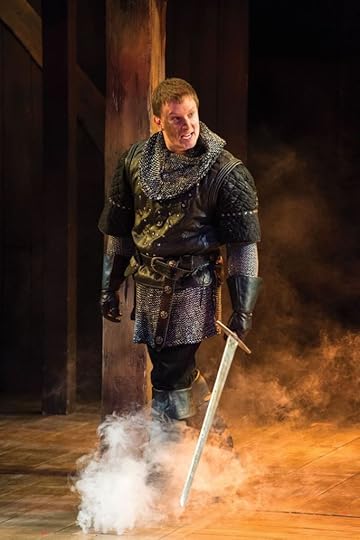
So how could Turambar’s life degrade from killing the drake, you might ask? Well, he passes out next to the Foalókë, and when Níniel comes to find him, she thinks he died along with the dragon in mortal combat. She weeps next to Turambar. She weeps for her husband. She cries for the man who killed the dragon and saved their people. But her weeping wakes Glorund for one last gasp.
“But lo! at those words the drake stirred his last, and turning his baleful eyes upon her ere he shut them for ever said: ‘O thou Nienóri daughter of Mavwin, I give thee joy that thou has found thy brother at last, for the search hath been weary – and now is he become a very mighty fellow and a stabber of his foes unseen (pg 109).”
Glorund died with these words, but what fell with the great beast was the glamor he held over Nienóri. She was suddenly aware of who she was and who Túrin was. Realization bombarded her that she had been married to her brother and had children with him. Aghast at the knowledge, she heads off to a waterfall called the Silver Bowl, contemplative. But instead of Nienóri coming to terms with the events of the last number of years, she is overwhelmed, and we get the quote that opens this essay.
Túrin wakes and quickly realizes that she is gone. He heads back to the village where the people already know the secret of their king and queen, and Túrin pulls it out of them. This being Túrin and his tragic story, he responds how you would expect him to:
“So did he leave the folk behind and drive heedless through the woods calling ever the name Níniel, till the woods rang most dismally with that word, and his going led him by circuitous ways ever to the glade of Silver Bowl, and none had dared to follow him (pg 111).”
Túrin turns to his sentient sword and begs for the only absolution his troubled life could understand.
“‘Hail Gurtholfin, wand of death, for thou art all men’s bane and all men’s lives fain wouldst thou drink, knowing no lord or faith save the hand that wields thee if it be strong. Thee I only have now – slay me therefore and be swift, for life is a curse, and all my days are creeping foul, and all my deeds are vile, and all I love is dead (pg 112).'”
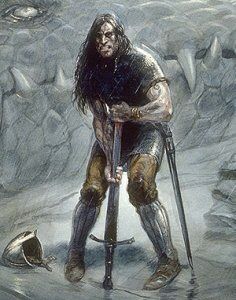
“and Turambar cast himself upon the point of Gurtholfin, and the dark blade took his life (pg 112).”
The tale doesn’t end here, however; Tolkien switches us back to Mavwin and her search for her children. She wept and went into the woods, and the region of Silver Bowl became haunted by their past and presence.
Tolkien also lays on some of his Christianity, which is notably absent in the later editions:
“Yet it is said that when he was dead his shade fared into the woods seeking Mavwin, and long those twain haunted the woods about the fall of Silver Bowl bewailing their children. But the Elves of Kôr have told, and they know, that at last Úrin and Mavwin fared to Mandos, and Nienóri was not there nor Túrin thier son (pg 115).”
Both the children ended up as spirits because their transgressions forbade them from the afterlife.
Join me next week as we dive more into the religion of the story and break down just what Tolkien was going for with such a horrifically tragic story.
October 26, 2023
Blind Read Through: J.R.R. Tolkien; The Book of Lost Tales, Part 2, Turambar’s Fourth Tragedy
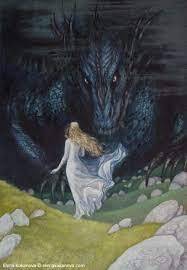
“Now as the days passed Turambar grew to love Níniel very greatly indeed, and all the folk beside loved her for her great loveliness and sweetness, yet was she ever half-sorrowful and often distraught of mind, as one that seeks for something mislaid that soon she must discover, so the folk said: ‘Would that the Valar would lift the spell that lies upon Níniel (Pg 101).'”
Welcome back to another Blind Read! This week, we continue with Túrin’s tale as it turns from dark to strange and learn how his bad decisions lead to his next tragedy.
This portion of the tale switches gears and focuses on Túrin’s mother, Mavwin, and his sister, Nienóri. We know already from the previous portions of the story that Mavwin and Nienóri left Hislómë and went down to try and find Túrin in Tinwelint’s hidden home, but when they got there, they found that Túrin had fled.

“Now the tale tells not the number of days that Turambar sojourned with the Rodothlim but these were many, and during that time Nienóri grew to the threshold of womanhood (pg92).”
Being a young lady, Nienóri would not accept being a ward of Brodda, so she convinced her mother that she would join Mavin on the sojourn to Tinwelint and to find her long-lost older brother.
They went through perils to get there, braving the creatures of the wilds, and then when they finally reached the Elven home, they found that Túrin was gone. They received conflicting reports that he was either dead or had been captured by Orcs and was made a thrall, like his father before him.
They soon find that the Foalókë (dragon) Glorund is in the area and might have Túrin in his grasp, so Mavwin and Nienóri steel themselves and head out to face the Foalókë and try to save him.
During this time, there were some exciting transitions that Tolkien was still working through (which is apparent in the notes). Túrin had changed his name to Turambar (or Mormakil) when he became an outlaw, which is at the same time Mavwin and Nienóri are looking for him. So when they questioned the people of the wood looking for Túrin, many of the Rodothlim they questioned didn’t know who Túrin was, because they only knew him as The Mormakil or Turambar. Without this comedy of errors, they wouldn’t have had to venture out and try to fight against Glorund because Turambar (as we’ll call him moving forward) had already escaped.
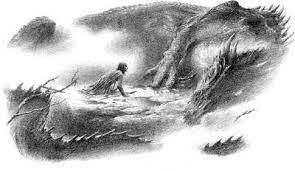
But alas, they sought the Foalókë and were caught in his glamor: “‘Seek not to cajole me, woman,’ sneered that evil one. ‘Liever would I keep they daughter and slay thee or send thee back to thy hovels, but I have need of neither of you.’ With those words, he opened full his evil eyes, and a light shone in them, and Mavwin and Nienóri quaked beneath them, and a swoon came upon their minds, and them seemed that they groped in endless tunnels of darkness, and there they found not one another ever again, and calling only vain echoes answered, and there was no glimmer of light (pg 99).”
Oof. This passage is probably as close to horror as anything in Tolkien. The dragon has put their minds in a cage, and mother and daughter never see each other again. They don’t recognize each other, and this transcends into the rest of the story. We follow Nienóri as she leaves and ends up living with wood rangers. In the woods, “she seemed to herself to awake from dreams of horror nor could she recall them, but their dread hung dark behind her mind, and her memory of all past things was dimmed (pg 99).”
For the rest of the tale, Tolkien writes Nienóri in this fashion. Confused and haunted, as if something is beyond her understanding or grasp, and this confusion leads to Turambar’s next tragedy.
Turmabar eventually gets to the hovel where the wood rangers live and he sees a beautiful young woman whom he calls Níniel because she cannot remember her name. He calls her this because she is distraught and crying when he finds her, and Níniel means little one of tears.
 Túrin and Níniel by Emberroseart
Túrin and Níniel by EmberroseartNienóri was just a baby the last time Turambar saw her, so he doesn’t recognize her, and there are copious liner notes from Tolkien himself which indicate how careful he needs to be, not to mention the name Túrin and give away the surprise. Because Turambar does not recognize her and Níniel does not remember her past, the two begin to court, which leads to the quote that opens this essay and Túrin’s next tragedy.
It seemed as though there was peace in Hisilómë, as The Foalókë didn’t know where they were hiding. For a time, there was prosperity, and “Like a king and queen did Turambar and Níniel become, and there was song and mirth in those glades of their dwelling, and much happiness in their halls. And Níniel conceived (pg 103).”
There is Turmabar’s fourth tragedy. Unbeknownst to him, he met a familiar and beautiful face in his sister, wooed and married her, then had a child through incest.
They lived in happy ignorance until a traitor found their home in the forest. Mîm the dwarf, known as Mîm the petty dwarf in The Silmarillion, betrayed their whereabouts.
The Foalókë charged out through the woods and smote some of the woodsmen. Turambar, being their chief, decided that he needed to do something.
“Now when Turambar made ready to depart then Níniel begged to ride beside him, and he consented, for he loved her and it was his thought that if he fell and the drake lived then might none of the people be saved, and he would liever have Níniel by him, hoping perchance to snatch her at least from the clutches of the worm, by death at his own or one of his liege’s hands (pg 104).”
His decision seemed to be sound reasoning at the time, but they were against a terrible foe in Glorund, the Drake who glamorized his whole family, and his wife/sister was still under that glamor. If we know anything about Turambar’s life, we know what will come next.
Join me next week as we conclude Turambar’s tale!
October 19, 2023
Blind Read Through: The Book of Lost Tales, Part 2, Túrin’s Third Tragedy

“And thereupon Turambar leapt upon the high place and ere Brodda might foresee the act he drew Gurtholfin and seizing Brodda by the locks all but smote his head from his body, crying aloud: ‘So dieth the rich man who addeth the widow’s little to his much. Lo, men die not all in the wild woods, and am I not in truth the son of Úrin, who having sought back unto his folk findeth an empty hall despoiled (pg 90).'”
Welcome back to another Blind Read! This week, we delve back into Túrin’s story and reach a turning point in his life. In addition, we get to experience Túrin’s third tragedy.
We left off last week with Túrin leaning into the Outlaw mentality and choosing that lifestyle in the woods and wilds. As we’ve discussed, Túrin didn’t have the easiest childhood. His father was a thrall to Melko, as were many of his people, and his sister died young. Mavwin, Túrin’s mother, sent him to live with Tinwelint as a ward to that Elven King. He lived with this idea of being an orphan his entire life, even though his mother lived and gave birth to another sister.
In his head, Túrin always felt as though others were looking at him as an outsider, so when he killed Orgol (his first tragedy), he assumed that others were judging him based on his family. It isn’t until he kills Beleg (his second tragedy) that he begins to think less of himself and his contributions to society, so he begins to slide into being an outlaw.
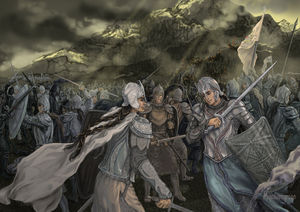
Túrin does not account for the area’s history and how Melko had corrupted things. After we find out about his outlaw shift, there is a meeting with the Rodothlim. To rally them for battle, “for he lusted ever for war with the creatures of Melko (pg 83),” he called for them to: “Remember ye the Battle of Uncounted Tears and forget not your folk that there fell, nor seek ever to flee, but fight and stand (pg 83).”
Túrin needs to take a history lesson. The Battle of Unnumbered Tears (later called in The Silmarillion), also known as Nirnaeth Arnoediad, was so named because of the sheer amount of dead and the Doom of Mandos.
Mandos laid down that curse because the Noldori killed their kin to go after Melko and recover the Silmarils. In that titular curse, Mandos tells the Eldar, “Tears Unnumbered ye shall shed,” In this battle, also known as the Fifth battle in the wars of Beleriand, Morgoth gains ground and begins to take over the land.
So, while Túrin is internalizing the wrongs of his life and turning to violence to assuage his conscience, he forgets that everything that caused the issues was because of the Noldor, not because of him or his deeds, horrendous as they are.
So Túrin leaned into his anger and spoke to Orodreth, a smith, for a weapon because he could no longer touch the sword he killed Beleg with. This creation deviates from what the story later became because Orodreth and not Eöl fashioned Gurthang.
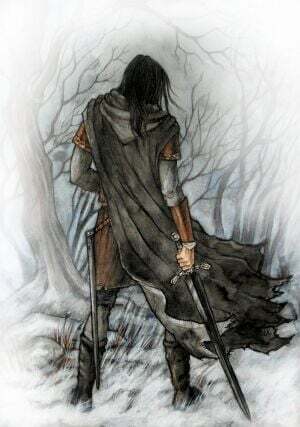
“Now then Orodreth let fashion for him a great sword, and it was made by magic to be utterly black save it’s edges, and those were shining bright and sharp as but Gnome steel may be. Heavy it was, and was sheathed in black, and it hung from a sable belt, and Túrin named it Gurtholfin the Wand of Death; and often that blade lept in his hand of its own lust, and it is said that at times it spake dark words to him (pg 83).”
Orodreth tried to speak against fighting against Melko’s armies, regretting his creation of the Wand of Death, but Túrin was both craving war and trying to atone for his past indiscretions, so he went out and fought every agent of Melko he could find. He became infamous, and it did not go past Melko’s sight. Melko released a great army, “and a great worm was with them whose scales were polished bronze and whose breath was a mingled fire and smoke, and his name was Glorund (pg 84).”
Glorund killed Orodreth, who, even on his death bed, reproached Túrin, blaming him for the destruction his range had caused. Túrin tried to fight, but the dragon had powers Túrin didn’t understand, and the drake charmed Túrin, holding him in place, while Failivrin waws carried away, crying out, “O Túrin Mormakil, where is thy heart; O my beloved, wherefore dost thou forsake me (pg 86).”
She didn’t understand that he had been charmed and thought he was letting the creatures kidnap her.
Túrin was trapped there with the mind games of Glorund until finally, the dragon set him free, allowing him to go after Failivrin or seek out his mother and sister, whom he only knew as a newborn.
He decides to go after his mother, only to find she has fled Dor Lómin. In her place, she left a local high-class man named Brodda to watch over her estate, but Brodda, seeing the wealth to be had, rebranded all her cattle and property as his own.
 Brodda by Sergio Botero
Brodda by Sergio BoteroTúrin had already killed, and now he had someone directly blame him for their misfortune (in Orodreth), and he chose the wrong path to find his mother, succumbing to Melko and Glorung’s deception.
It is at this point that Túrin forsakes morality. He is no longer trying to be an upstanding citizen. Even in his outlaw stage, his actions were to help and save others. It is here that we get the quote at the beginning of this essay, and it is here that we see Túrin’s next tragedy. He has given into his anger and hate, gone over to the dark side (forgive the crossover), and decided to go with full-fledged murder.
Moving forward in his story, he is still an outlaw, but he is no longer an outlaw for the good of the people. He is now an outlaw hell-bent on his emotional trajectory.
Join me next week as we continue on Túrin’s journey!
October 12, 2023
Magic Does Exist

It’s easy to write the phrase “with everything going on in the world.” There is, and will always be, a never-ending stream of horrible things happening, so perspective is more critical now than ever.
We live in a digital age, where news and op-eds are at our fingertips 24/7, and things like social media have fostered an interesting change to our psyche. We have created perspective silos, where we only see what we want to see, creating division between one another. Then we have politicians who are only out for themselves who are stoking this division.
These kinds of rifts have and will always be around, but one thing we have forgotten as a society, as humans, and as creative beings is that there is still magic in the world; and magic is what will save us from ourselves.

I was driving with my wife this past weekend on the central coast of California celebrating our tenth anniversary, and off the coast, oil rigs were sitting out in the ocean. I had no idea they were there (or that there was a drilling operation so close to our coast), so naturally, being a fantasist, I immediately thought they were some ship. My mind turned to Pirates out in the ocean, sailing the wide blue expanse in search of meaning and freedom and booty.
Of course, I didn’t verbalize this and asked what they were because I couldn’t get the visual out of my head (Though my wife is awesome and knew exactly what I was thinking and why I asked). When she told me what they were, I nodded, and we moved on, but there was magic in the world again for that brief moment. There was still the possibility of a real-life version of the Pirates of the Caribbean, where there were curses and magic and epic fights on the seven seas, where no one really dies, and you always find out that there is just one more item beyond reach that can give understanding and have the world make sense.
People, in this digital age, have forgotten that there is magic in the world. The drive to get clicks, and the pressure to be famous or influence and show how good your life is to strangers online has taken precedence over enjoying the little things.
Speaking of pirates, The Pirates of the Caribbean series was so popular (and Disney in general) because it introduced the world’s elements that were thought impossible.

On the one hand, you have the East India Company, which represents reality, corporations, and the everyday grind. Everything about that concept is about control and making the world smaller. About controlling the magic in the world for profit. The more we know about the world, the less magic there is, the less there is to wonder about, and we end up just accepting that the daily grind is all there is, and the company gets what it wants… good workers that realize there is nothing beyond their Friday paycheck.
Captain Jack introduces us to a character who knows there is magic left in the world. But not magic in the traditional sense. Not witches, wizards, and spells (though that can be a part of it), but wonder and imagination. We are asking people to grow up far too quickly, telling them that the harsh reality is all there is, and disparaging people who want to believe there is something more in the world. We tell people to “grow up,” stop being childish and take things more seriously.
But what does that do for you? If all you can do is internalize the cold, hard reality, it only leaves room for disdain, hatred, and sadness. Then disassociation is the only thing left, which isn’t a healthy alternative.
Fantasy isn’t necessarily escapism but a filter on the lens of the world. Fantasy allows you to experience the world in a way where magic still exists.
There is a reason that Disneyland is “the happiest place on earth,” and it’s because they focus on the individual details. They miss no brush stroke; every rock is overturned. There are hidden Mickeys throughout the park. Each land can let you immerse yourself in the wonder of that world. The details allow you to experience the magic that still exists in our world, so your mind can slip into that magic when you hear a song or see an article of clothing.
Magic and fantasy are not about escapism but realizing that the world isn’t myopic. Life isn’t dictated by corporations or political rhetoric. Life is created and run by magic, and things are still hidden. Look hard enough to find your hidden mickey in the sand, trees, or oceans. Be your own Imagineer and make your own mystery, create your own wonder. Discover your own treasure map that leads to some hidden fantasy, even if you can never find it.
Magic is still alive and well in the world, and we are here to experience it. Work will always be there; go and find your magic. Go and find your purpose.
October 5, 2023
Blind Read Through: J.R.R. Tolkien; The Book of Lost Tales, Part 2, Túrin’s Second Tragedy

“In that time was Túrin’s hair touched with grey, despite his few years. Long time however did Túruin and the Noldo journey together, and by reason of the magic of that lamp fared by night and hid by day and were lost in the hills, and the Orcs found them not.”
Welcome back to another Blind Read! This week, we cover Turambar’s second tragedy and discover his life and vision of himself as an outlaw and what that means for him moving into the rest of his story.
We left off last week with Túrin leaving Doriath and heading off into the wilds, where he met up with Beleg, an Eldar of the court of Tinwelint. Tolkien spent time developing Beleg later in the Silmarillion (probably to give Túrin’s actions more significant stakes). Still, in this version, he becomes a traveling companion and a Captain against Melko.

The two range in the wilds and hunt orcs and other foul creatures of the darkness. For many of these hunters, the goal was to lessen Melko’s hold on the world and make it a little more accessible for everyday people to wander. For Túrin, it was about killing these foul creatures, which showed his true nature.
In the Silmarillion, Beleg played the role of the conscious. Túrin ran off with the outlaws, and Beleg was sent after him to be a protector and to remind him of his upbringing. There is even a sentiment that Beleg should bring Túrin back if possible, and he is given the Dragon Helm of Dor-lómin to give to Túrin to show that even if he doesn’t come back, they wish him to be safe.
In The Book of Lost Tales, Beleg is already out in the wilds, and Túrin joins him. Their bond is strong, and they become like brothers out in the wilds hunting the creatures of Melko. But living that life can only last so long before life catches up with you.
It wasn’t long before they came across “a host of Orcs who outnumbered them three times. All were there slain save Túrin and Beleg, and Beleg escaped with wounds, but Túrin was overborne and bound, for such was the will of Melko that he be brought to him alive (pg 76).”
Túrin stayed a captive of the Orcs for some time. They abused and beat him to within an inch of his life, and “was Túrin dragged now many an evil league in sore distress (Pg77).”
During this time, Melko unleashed “Orcs and dragons and evil fays (pg 77)” upon the people of Hithlum to either take them as thralls or kill them as retribution for the outlaw brigade led by Túrin.
Meanwhile, Beleg wandered in the wilds, killing evil creatures and looking for his lost compatriots. He did so until he came upon an encampment of Orcs and saw that in this camp was a restrained Túrin. Thus, we get Túrin’s second great tragedy:

“but Beleg fetched his sword and would cut his bonds forthwith. The bonds about his wrists he severed first and was cutting those upon the ankles when blundering in the dark he pricked Túrin’s foot deeply, and Túrin awoke in fear. Now seeing a form bend over him in the gloom sword in hand and feeling the smart of his foot he thought it was one of the Orcs come to slay him or torment him – and this they did often, cutting him with knives or hurting him with spears; but now Túrin feeling his hand free lept up and flung all his weight suddenly upon Beleg, who fell and was half-crushed, lying speechless on the ground; but Túrin at the same time seized the sword and struck it through Beleg’s throat…(pg 80).”
Túrin felt like an outcast because he was a man living with Elves and his accidental killing of Orgof, but now, with the murder of Beleg, he has become a full-fledged Outlaw. It is not in his nature to return to Tinwelint and confess his wrongdoing, even if the Elven King would forgive and pardon him. Túrin internalizes his struggles and becomes depressed in the way only a Man (human) can.
Tolkien wrote the races of Middle-earth (I have still not seen a mention of Beleriand yet in The Book of Lost Tales) to have all range of emotion, but Elves never really seem to get maudlin like Men do. Their immortality gives them a view of the world that eliminates general depression, but Man’s mortality appears to encourage it. We see that slightly in Beren, but it is full front and center for Túrin. His entire story has a sort of “woe is me” feel – even though it’s his fault that these things happen to him. Túrin lives his life in a state of impetuousness, which leads to desperation. In that desperation, he takes events as they come to him without giving them a second thought.
So when he escapes the Orcs with the Elf Flinding, who incidentally is also a bit of an outcast for his actions, they come across a group of wandering Men called the Rodothlim who live in caves.
The Rodothlim “made them prisoners and drew them within their rocky halls, and they were led before the cheif, Orodreth (pg 82).”
Here in the caves of the Rodothlim (which I believe must be a precursor to the Rohirrim), Túrin met Failivrin, a maiden of those people. She quickly met the dreary man and “wondered often at his gloom and sadness, pondering the sadness in his breast (pg 82).”

Despite her affection for him, Túrin couldn’t leave his past behind, “but he deemed himself an outlawed man and one burdened with a heavy doom of ill (pg 82-83).”
The caves of the Rodothlim had a strange effect on Túrin. Those people survived in the wilds because their caves gave them a veil from Melko’s agents and eyes, which gave Túrin a respite from having to face those monsters directly – but it also gave him time to think, dream, and replay his past life. In those caves of safety, Túrin made a mental shift and knew he could never be accepted in any typical setting. He was born an outlaw, and his fate was exclusively intertwined with that life. He decided to lean into the outlaw life, which was just one more bad decision in a long list of bad choices.
Join me next week as we continue on Túrin’s tragic journey!
September 28, 2023
Blind Read Through: J.R.R. Tolkien; The Book of Lost Tales, part 2, Túrin’s first tragedy
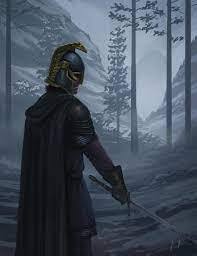
“To ease his sorrow and the rage of his heart, that remembered always how Úrin and his folk had gone down in battle against Melko, Túrin was for ever ranging with the mosst warlike of the folk of Tinwelint far abroad, and long ere he was grown to first manhood he slew and took hurts in frays with the Orcs that prowled unceasingly upon the confines of the realm and were a menace to the Elves (pg 74).”
Welcome back to another Blind Read! This week, we begin to learn a bit about Túrin and experience his first tragedy of character while trying to understand Tolkien’s purpose in the themes of this tale.
Tolkien spends much of his time in this early version of Turmabar, striving to show the differences between Men and Elves (the more Tolkien created, the less he described Elves as Gnomes. It seems like he started to think of Gnomes as anything fay-like, as the moniker became a catch-all). Men tended to be less unkempt, more creatures of passion, whereas Elves were much better groomed and stoic.
Through this time, Tolkien was still developing his story, language, world, and its peoples, and these lost tales were written as an exploratory first draft to get the world out of his head and onto paper, but, as evidenced by The Silmarillion, Tolkien was not happy with these early drafts. They lacked cohesion and a thematic goal.
 art by Ivanalekseich
art by IvanalekseichAn example of this is as follows: “Now Túrin lying continually in the woods and travailing in far and lonely places grew to be uncouth of raiment and wild of locks, and Orgol made jest of him whensoever the twain sat at the king’s board; but Túrin said never a word to his foolish jesting, and indeed at no time did he give much heed to words that were spoken to him, and the eyes beneath his shaggy brows oftentimes looked as to a great distance (pg75).”
Túrin is a Man (as in every other Blind Read; read this as Human whenever capitalized), and Men are described as much more feral creatures. This classification was the original intent of Men, specifically because of Tolkien’s experiences in The Great War, he distrusted human instinct and saw humans as impetuous and violent creatures. Violent and feral is a very apt description of how Túrin (and almost every other Human in this story thus far) is described. He is animalistic; he “seemed to see far things and to listen to sounds of the woodland that others heard not (pg 75).” “He was moody (pg 75).”
One function of this could be because the majority of Men in these early stories that came from Hithlum were captured by Melko and held as thralls and slaves for many years, and Túrin (in The Book of Lost Tales, not The Silmarillion) is no exception, but more realistically Tolkien initially created Men this way because they were not born of the gods the way the Eldar were. Their lives are short; thus, they are much more emotional and prone to reaction because they need to feel the depths of emotion and experience much quicker than their immortal brethren.
This version of Turambar is much less tragic and much more vicious. Orgof, the Eldar we saw above who was a playground bully of Túrin, takes the place of Saeros. In the later Silmarillion version, Saeros is still a bully, but when Túrin finds him in the wilds, he turns the tide and strips Saeros naked, intending to embarrass the bully. Saeros, terrified, tries to jump a Fjord and falls to his death. This accidental death is the first event that makes Túrin an outlaw, but in this version, nearly everyone in Doriath sympathizes with Túrin and tries to get him to come back, but his conscience is what pushes him further into exile.
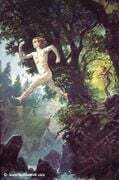 Saeros by Ted Naismith
Saeros by Ted NaismithThis earlier version is entirely different:
“Then a fierce anger born of his sore heart, and these words concerning the lady Mavwin blazed suddenly in Túrin’s breast so that he seized a heavy drinking vessel of gold that lay by his right hand and, unmindful of his strength, he cast it with great force in Orgof’s teeth, saying: ‘Stop thy mouth therewith, fool, and prate no more.’ But Orgof’s face was broken and he fell back with great weight, striking his head upon the stone of the floor and dragging upon him the table and all it’s vessels, and he spake nor prated again, for he was dead (pg 75).”
Túrin’s actions were murder in this earlier version. It was an act of a feral and impetuous being, as we should expect from any Human in these early tales of Tolkien.
To take that a step further and show the difference between Elves and Men, Tinwelint and his court show incredible understanding. “Yet they did not seek his harm, although he knew it not, for Tinwelint despite his grief and the ill deed pardoned him, and the most of his folk were with him in that, for Túrin had long held his peace or returned courtesy to the folly of Orgof (pg 76).”
Meanwhile, Túrin runs away and joins a group of people in the woods described as “wild spirits (pg76).” Again, Túrin is a Human and feeds into his animalistic tendencies. His emotions are so high that he cannot understand that there could be clemency for him in Doriath because he does not hold any for himself. His emotions again overpower him, and he runs off to the only place where he feels at home, in the forest with ruffians.
This kind of childish behavior is endemic to Men in early Tolkien, and it isn’t until the later versions (I believe The Silmarillion is either the Third or Fourth draft) that they begin to get more depth and character. The whole point of these stories evolved from being a general history of our world to actual ages of time, and this time was the Age of the Eldar. Tolkien’s main goal, however, was leading his fairy tale, through Eriol and The Cottage of Lost Play, to the fourth Age. The Age of Men.
Join me next week as we introduce one of The Silmarillion’s best characters, Beleg, and discover Túrin’s second tragic act.
September 21, 2023
Blind Read Through: J.R.R. Tolkien; The Book of Lost Tales, part 2, Turambar
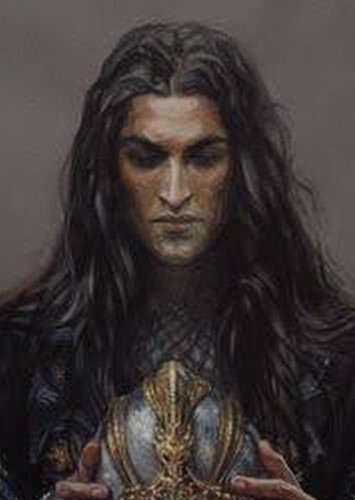 Art by Elena Kukanova
Art by Elena Kukanova“Now coming before that king they were received well for the memory of Úrin the Steadfast, and when also the king heard of the bond tween Úrin and Beren the One-handed and the plight of that lady Mavwin his heart became softened and he granted her desire, nor would he send Túrin away, but rather said he: ‘Son of Úrin, thou shalt dwell sweetly in my woodland court, nor even so as a retainer, but behold as a second child of mine shalt thou be, and all the wisdoms of Gwendheling and of myself shalt thou be taught (Pg 73).'”
Welcome back to another Blind Read! This week, we introduce Túrin and his tragedy while getting some commentary about Tolkien’s decision to create a story throughline instead of the history that the tale became.
Christopher begins this chapter by speaking of the timeframe of the writing itself and how his father wrote Turambar in the time between the original script of Tinúviel and the edits of that tale:
“There is also the fact that the rewritten Tinúviel was followed, at the same time of composition, by the first form of the ‘interlude’ in which Gilfanon appears, whereas at the beginning of Turambar there is reference to Ailios (who was replaced by Gilfanon) concluding the previous tale (pg 69).”
I bring this to your attention because of the profound changes Tolkien was making at the time and the apparent fact that Christopher missed when he made the assertion of Beren always being intended to be Eldar.
Ailios or Gilfanon said, shortly after his introduction, “‘Now all folk gathered here know that this is the story of Turambar and the Foalókë, and it is,’ said he, ‘a favourite tale among Men, and tells of very ancient days of that folk before the Battle of Tasarinan when first Men entered the dark vales of Hisilómë (pg 70).'”
Tolkien establishes almost immediately that this is a story about Men, not Gnomes or Elves, and it is only a few pages later that we get this passage:
“…but the deeds of Beren of the One Hand in the halls of Tinwelint were remembered still in Dor Lómin, wherefore it came into the heart of Mavwin, for lack of other council, to send Túrin her son to the court of Tinwelint, begging him to foster this orphan for the memory of Úrin and of Beren son of Egnor (pg 72).”
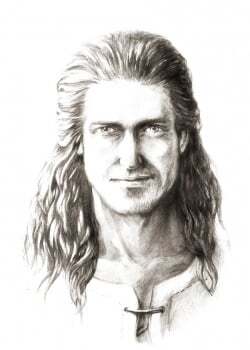 Beren
BerenHere, we get a direct correlation between Beren and Úrin, one of which is a Man and the other is an Elf in the established setting. To go even further, in the opening quote of this essay, Tolkien states that Beren and Egnor were friends, and before this passage, in early Tolkien, there was no love lost between Elves and Men. This is the first instance of the earlier works where an Elf and a Man were friends.
I contend that this was an accident on Tolkien’s part because he was already beginning to think of Beren and Egnor as Men. After all, it fits the story so much better. There is even a passage where Egnor is “akin to Mavwin.” Egnor is Beren’s father, and Mavwin is Túrin’s mother, thereby stating that Egnor was, at the very minimum, a half-elf, but such things never existed in Tolkien. (You might remember Elros and Elrond, who were born half-elves; however, the Vala made them decide which side they were to fall on, and Elros became a man and founded the Númenóreans and Elrond became an Elf…and we know how that story ends)
Tolkien also brings back the Path of Dreams, or Olórë Mallë, to explain how Ailios (Gilfanon) knows these stories firsthand (there is a reference that he also knows the story of the fall of Gondolin: “and I knew it long ere I trod Olórë Mallë in the days before the fall of Gondolin (pg 70).” The more that I read of these Lost Tales, the more I understand why Tolkien took Gilfanon out of the story, and why he also took out the transitions.
Tolkien initially wanted these stories to flow into one another with a central story hub (think Ray Bradbury’s The Illustrated Man) because he was worried that people would not be interested in the dry history of a land that didn’t exist. To tell this tale in a “Hobbit” style might make it more accessible to the everyday reader. However, he ran into the problem of how to make it work. He knew who Eriol was, and there were plans for him (which I believe will come to light in the last chapter of The Book of Lost Tales, part 2), but how does he get the surrounding characters into the work? The people who tell the tale? Well, he created things like Olórë Mallë, a sleep bridge that can get men (and only men apparently, as no Elves needed it because of their immortality) to different areas of space and time. He also created spaceships (literally ships that could sail across the sky) but decided to limit that to elevate a single character, Eärendil, to a godlike being as he sails his ship Vingilot across the sky.
 The Voyage of Vingilot by Mellaril
The Voyage of Vingilot by MellarilThese ideas were a means to an end, and he only used them to tell the story. He eventually realized that these plot devices were only taking away from the story instead of enhancing it, but his quandary was that to take them away removes all credence of the story that was being told. For this reason, I believe Tolkien took out the transition pieces with Eriol learning the histories.
That leads us right into Turambar because, as Ailios describes Úrin and how he knew Beren and his travails. Mavwin, Túrin’s mother and Úrin’s wife, decided that Túrin would be safer staying with Tinwelint, than he would up north with the threat of Melko.
Thus, Túrin’s story begins.
“Very much joy had he in that sojourn, yet did the sorrow of his sundering from Mavwin fall never quite away from him; great waxed his strength of body and the stoutness of his feats got him praise wheresoever Tinwelint was held as lord, yet he was a silent boy and often gloomy, and he got not love easily and fortune did not follow him, for few things that he desired greatly came to him and many things at which he laboured went awry (pg 74).”
Join me next week as we continue the tragedy of Túrin Turambar!



